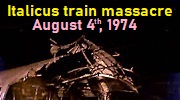 tunnels
tunnels  tunnels
tunnels Travelling by train from
Florence to Bologna, you go through two little stations, which
are similar one another: one is named Vernio
and the other San Benedetto Val
di Sambro. They share a trait: they lie at the two ends of
a very long tunnel, the Great Apennine
Tunnel, with a lenght of more than 18 kilometres (about eleven
miles).
The little stations have some more trait in common: the first
one is close to the point in the tunnel where the Express
train (rapido) 904 exploded, on December 23rd
1984 (15 people killed and 267 wounded), the other is the one
in which, coming out from the tunnel, the Italicus
Express exploded, on August 4th, 1974 (12 people killed and 48
wounded, see my webpage).
The Fascists who put the bomb in 1974 did not want the train would
explode in the tunnel: they planned to make it blow in Bologna
station, aiming to kill more people, but the train was delayed
and went off too early. The mafia killers who put the bomb in
1984, instead, made it explode on purpose in a tunnel, to boost
the effects of the blast.
However they once succeeded in making Bologna
station blow up: on August 2nd, 1980 (see my
webpage) they struck without fail and put the bomb in the
waiting room, then went away, they weren't kamikaze after
all, they just were fascists or secret service hit men, more probably
both at the same time, there wasn't and still there isn't any
conflict of interests.
The Fascists use to say they follow the SS motto, “My
Honour is Loyalty”. I wonder if making some innocents
blow up while they're waiting for the train falls within "honour"
or rather within "loyalty"; and besides the fascists
use to mention Homeland, but maybe Italian trains and stations
don't belong to the Homeland, maybe they are extraterritorial.






On Italicus Express also
a Japanese tourist died, Tsugufumi Fukada, perhaps he didn't even
know who the fascists were, and certainly he didn't know that
the fascist terrorist Delfo Zorzi would be run away in Japan and
would have even obtained the citizenship of that country.
Tunnels, as places of remembrance are kind of peculiar, different
from the others: if you are outside you can stop in the waiting
room of Bologna station and think of the people who were there
on August 2nd, 1980, reading a newspaper and
waiting for a train, or even you can empathize with the persons
who were queuing up tor make a deposit into the Bank of Agriculture
in the square piazza Fontana
in Milan on December 12th, 1969, and you can also identify
with the workers who were taking part in a trade-union meeting
in Brescia on May 28th, 1974, in the square piazza
della Loggia, to the passengers of the DC9
in Ustica on June 27th, 1980, to the students who sat
in their classroom in Casalecchio
di Reno on December 6th, 1990, or to the babygirls who
slept with their parents in via dei Georgofili,
in Florence, on May 27th, 1993.
But this can't happen in railway tunnels; you can only go through
them by train, you barely have the time to pass there for few
seconds and imagine the abyss of terror, dismay, darkness and
pain experienced by that people twenty ot thirty years before,
but you are anyway in transit, in a rush, in a warm and safe place,
the lights are on, maybe you're chattering with those with the
seats next to yours or you are speaking on your mobile.
Then tunnels end, even the very long ones, like those in which
the slaughters happened, you go out in the daylight, you see meadows,
hills, life, and all this put an end to your empathy with those
dead, with their souls, if you believe in soul, or with their
memory, if you are an unbeliever like me.
I wonder how their parents manage to take them a flower, who knows
if they ever pass through that tunnel, and if so, what they feel
(are the Japanese man's relatives still coming?), who knows if
as they get by train into other tunnels they feel strange, or
sad, or scared.
Doesn't matter if the fascist and the mafiosi had actually chosen
to make the trains blow up in a tunnel, anyway a tunnel is a perfect
scene of horror in the collective imagination, even for those
who are not claustrophobic.
It's a scene already visited by the railway accidents: in 1944
an overloaded goods train drawn by a steam engine stopped on his
climb in the tunnel galleria delle
Armi (see my webpage on it)
between Balvano and Bella, in the region Basilicata, southern
Italy, more then 500 people choked to death by the smoke, the
massacre wasn't determined by somebody, but also that place is
forgotten, hardly somebody knows about the tragedy and very few
people know where it took place, therefore almost nobody can think
of that event as he gets into that tunnel






Until few years ago at
San Benedetto station some coach of Italicus Express still remained,
then they have been scrapped. You could see them passing with
the train, maybe they prevented people from forgetting, it was
better they didn't. Their images can still be seen at the end
of the film “Strane storie” (Strange Stories) by Sandro
Baldoni, brother to Enzo, another
victim of an unpunished slaughter. Today a fragment of that train
became a monument, in front of the
little station.
Now the fascists have turned good, they even go to Jerusalem,
at Yad Vashem, to pay homage
to the Shoah's victims, sometimes they even dare to level accusations
of anti-Semitism against the others.
Oblivion saves them, years ago the late President of the Republic
Francesco Cossiga wanted to remove the
word “fascist” from the memorial
plaque in Bologna station, and slowly slowly, thanks to their
old buddy which owns plenty of TV stations, they try to live down
all the slaughters they made, when they guided the nazis to massacre
newborn babies and pregnant women in the small village of Marzabotto, when they were kept on
a leash by C.I.A. putting bombs in the banks, trains, railway
stations and places, especially if there was a trade-union meeting.






At last the memory doesn't
belong anymore to the people, many of them entrusted it on contract
to some zealous storekeepers, that give it them a little at a
time, just when they want.
They remind you that fascism was a very important twenty-year
period (in order to sell you De Felice's books), that the Communists
have on their conscience hundreds of million victims (maybe also
the Auschwitz ones: wasn't the Red Army guilty for it?) or that
the judicial inquiry on political corruption Mani Pulite (Clean
Hands) was just a political character assassination operation
(bribes? Yes, I remember those of the red co-op).
Then if someone perseveres in cultivating his own personal memory,
based on the things that he has experienced, seen and thought,
but that unavoidably clashes with the brand-new collective memory,
he can only be a terrorist, or even, at best, a visionary dodderer.






 page
created: January
9th 2011 and last updated: January 26th, 2025
page
created: January
9th 2011 and last updated: January 26th, 2025